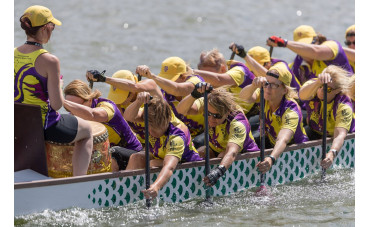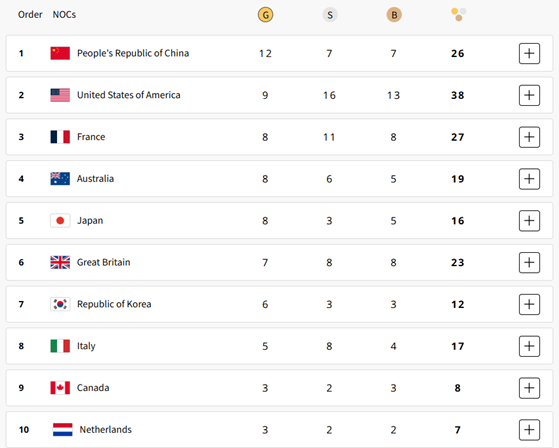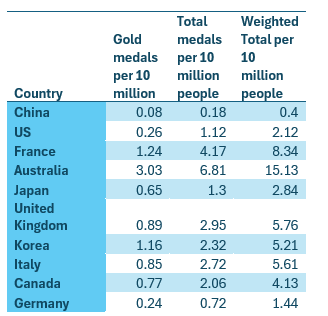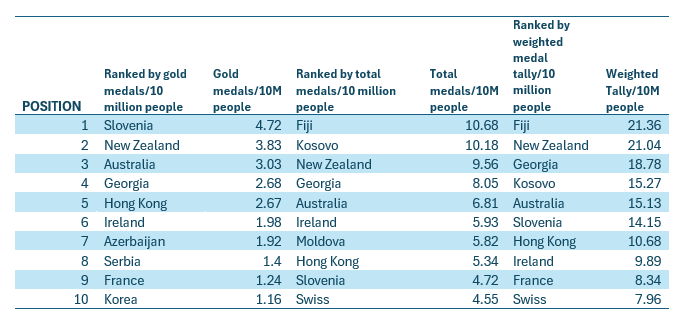2024 Olympic Medal Tally on a per capita basis
- 03 Aug, 2024
- Home , Activity
- 5 Comments

Current as of 10:30 AEST, August 2, 2024.
Those of you following along with the Olympics, or even those of you not following along with the Olympics (indeed, really just anyone who is not living under a rock), have likely become well familiar with the Olympic medal tally. As of 10:30 AEST, it looked something like this (live tally available here):

Perhaps you don’t care much about this tally and are more following along with the Olympics for the pure spectacle of it (you can read more why we enjoy the Olympics here), or perhaps you are religiously checking to see if your country has any updates. Or perhaps, you are just generally fascinated by the tally in general as an insight into different countries and what sports different countries prioritise/are good at. But such a tally of course does not tell the whole story. Factors such as cultural experiences around sport, funding and support given to athletes and government commitment to nurturing talent, of course make a huge difference. And then, of course, there’s the matter of population.
The leading nations, China and the US, have populations of 1,425,671,352 and 339,996,563 respectively based on data from the United Nations Population Division estimates. Third placed France, on the other hand, only has a population of 64,756,584, about 20% of the population of the US and 5% the population of China. Australia, in fourth place, has a population equivalent to roughly 8% of the US and 2% of China. This got us thinking: what exactly would the medal tally look like if arranged by number of medals per capita? We get the feeling that Australia punches well above its weight when it comes to Olympic success, but can this feeling be quantified by statistics?
Before we display our findings, there are a couple of things to note about our rankings. We ranked countries in three ways: first, based on gold medal tally per capita; second, based on total medal tally per capita; and third, based on total points per capita using a weighted ranking system. We note, however, that such rankings are not without controversy. There is even disagreement within the third category of weighted ranking system relating to how each medal should be weighted. For example, the New York Times weighted point system assigns 4 points to gold, 2 to silver and 1 to bronze in comparison to a simple weighted system which only assigns 3 points to gold. Formally, the International Olympic Committee does not explicitly state which weighting method is preferable. The live tally goes off total gold medals rather than a weighted tally. Hence, we’ve decided to just include three separate rankings, which compare all 50 countries which had won a medal at the time this article was last updated. For our weighted ranking, we’ve opted for a simple weighted system (3:2:1). So for the top 10 current countries, the numbers look something like this:

Ranking-wise, that looks like this:

Nothing too surprising about those tallies right? Now, let’s bring total population into play. That’s were things start to get interesting.
When each of those tallies is expressed as a number per 10 million people, the figures look something like this:

Tells a bit of a different story right? So here’s how the rankings look based on medals/capita:

Interesting, hey? But if you look closely, you will notice that some countries in the overall rankings still rank highly when medals are expressed on a per capita basis. France for example, comes in 9th when gold medals are ranked per 10 million people and for total medals per 10 million people. However, there is only one country which makes it into all 6 top 10 rankings. Yep, that’s right: it’s Australia! We come in fourth ranked by Olympic gold medals and weighted medal tally and fifth for total medals. And that doesn’t change much even when medals are expressed per capita. We’re third for gold medals per capita, and 5th for total medals per capita and weighted total medals per capita. Not bad Australia! Turns out we were right: Australia really does punch above its weight when it comes to world sport. And let’s not forget our neighbours in New Zealand and Fiji! Pretty incredible performances!
Our Olympics Celebration
SCODY are proud to play a small part in that performance by supporting athletes of all different levels across all different sports to look good, feel good and perform by manufacturing high quality sports gear right here in Seventeen Mile Rocks, Brisbane. To celebrate the diverse range of sports currently being showcased on the world stage, we’ve decided to release our FIRST EVER retail of high performance gear specifically for sports ranging from paddling, to rowing, to mountain biking, triathlon, sailing, swimming and more. You can check it out here!
Custom and Design Your Own Apparel
And don’t forget that we make custom gear too! Part of a social sport team, a local rowing group, a group of friends off on a sailing trip? You name it, our custom team is here to help! You can get in touch here. Want a smaller number of garments which you design yourself? You can also use our Design Your Own online feature to create your own custom team wear using your own design! Check it out here.
Neat article. I love the details. I’m curious if there is value at one more area - per number of participants / athletes by country. I know some countries like the US send a large number of athletes to the games (~550 comes to mind) but I don’t see the totals for all countries. It would be interesting to see number of participants sent per capita by country as well as medal counts as you show in your article based on the participants population.
There’s an academic paper ‘out there’ which has come up with a system to rank countries by medal/population, but taking out the oddity where a country with 32k pop comes top with one medal. (Add the bottom 60 countries by pop together & you end up with the equivalent of a France or Germany)
Also, given the difference between gold & bronze is quite often measured in fractions of seconds, or equivalent, medals should be weighed the same as each other
Results using this system: countries like France, Netherlands & the UK punch well above our weight (by population)
Linky: https://content.iospress.com/articles/journal-of-sports-analytics/jsa240874
My wife and I are Punjabi Indian Nationals but have been living in Australia for 15 years with kids just under 10.
With over 35% of the population of 25 million people being born overseas.
China and India having over 3 billion people at home. You can\'t buy land or get free stuff there!
The medals don\'t surprise me. We got our Australian citizenship and now all refer to ourselves 100% Australian. Very rare
There ere are about 5 million Indians, Chinese and SEA born people living here. Yet, we all call ourselves minorities and not Australian. As Australia and people don\'t force you to join in activities.
Other foreigners living here get citizenship for free healthcare, no crime and equality.
The stereotypes of Australian\'s is wrong. They make fun of themselves but are very intelligent (in general). TV bad though.
Sadly, (Australia is now bad at training local white Doctors and science. so now hard to find but are the best. Now Bad at looking after their own born citizens, housing included). Privatised it all. Import instead now.
The quiet reclusive mid-higher income whites and they punch above their weight in all. Heck even cultured with all the travel.
Kids have white school friends, Chinese, Indians even Pakistani. Such diversity. We have moved on and apart from their terrible TV that makes fun.
Don\'t underestimate the Aussie. Work hard, play hard. Learn lots, Play sport!
Article needs to be updated as at end of the games
I\'m an Aussie borne & bred.
I live in a multi cultural world.
I\'m blue collar, work in a very multi cultural workplace.
Our medal count is multi cultural.
I love it.
We strive...we get better.